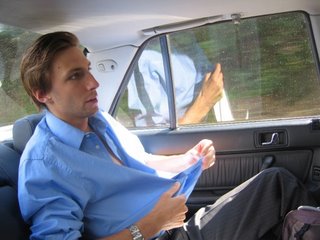A new conversation
CR: Do you remember when I asked you to wash the bathroom mats two weeks ago?
Me: Yes.
CR: Have you?
Me: No. I haven't had to do my laundry yet.
This is a lie. I did my laundry last week. But I take my laundry out and didn't want scuzzy bath mats mixed in with my clothes, and I didn't have faith that the laundromat would separate them even if I asked.
CR: Well it should be easy to do.
Me: When are you doing yours?
CR: Maybe this week.
Me: If you do yours before mine, could you wash the bath mats?
A pause. Pauses are always bad.
CR: No.
Me: Why not.
CR: It's your responsibility.
My apartment is like boot camp.
Me: I feel like you're training me, or trying to at least.
CR: Name the last time I told you to do something.
Me: Last week when you told not to get so much water on the bath mats.
I wish there were a punch line, but it really just goes on like this for a while.
Friday, February 09, 2007
Monday, February 05, 2007
A Polish travel writer, speaking of his newspaper assignment to travel abroad for the first time, to India, in the mid-1950s, had this to say:
We are assailed by images. No unconquered frontiers exist. At the collective level this is certainly true, but even at the individual level it's becoming rarer. By the time we're 18 we've seen the deprivations of African poverty, newly minted Chinese millionaires, meth addicts in Peoria, tar oil fields in Alberta. We are Dresden under a fusillade of pixels and negatives.
I see two major problems with this. One is that the images that we see are highly crafted and stylized, and they almost never represent reality. They might represent some sliver of reality, but partial reality is just a style of equivocation. Secondly, new experiences can never really be new. A trip abroad will always be preconceived before its actual conception. Before traveling to India, I know exactly what to expect, or at least what I'm supposed to expect. Our ongoing experiences with new things are shaped and determined by prior exposure to them through images.
"My first reaction was astonishment. And, right after that, panic: I knew nothing about India. I feverishly searched my thoughts for some associations, images, names. Nothing. Zero."This sentiment belongs to a different generation. I can imagine no person born after 1980 harboring such a blank slate for a place. Or, if some person did, and ever had any reason to become aware of that blankness, they would be quick to rush to the internet, or television, or video store, or maybe even a bookstore, to quickly acquaint themselves with the world's collective knowledge on the subject.
We are assailed by images. No unconquered frontiers exist. At the collective level this is certainly true, but even at the individual level it's becoming rarer. By the time we're 18 we've seen the deprivations of African poverty, newly minted Chinese millionaires, meth addicts in Peoria, tar oil fields in Alberta. We are Dresden under a fusillade of pixels and negatives.
I see two major problems with this. One is that the images that we see are highly crafted and stylized, and they almost never represent reality. They might represent some sliver of reality, but partial reality is just a style of equivocation. Secondly, new experiences can never really be new. A trip abroad will always be preconceived before its actual conception. Before traveling to India, I know exactly what to expect, or at least what I'm supposed to expect. Our ongoing experiences with new things are shaped and determined by prior exposure to them through images.
Subscribe to:
Comments (Atom)
